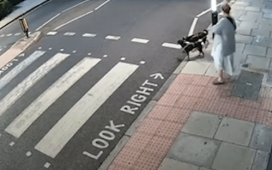Experts have called on Chancellor Rachel Reeves to make significant tax cuts in this year’s Autumn Budget to help boost the UK’s electric vehicle industry.
The Confederation of British Industry has urged the Chancellor to slash taxes for electric car manufacturers, aiming to accelerate the drive towards net zero emissions.
This proposal comes at a crucial time, with the UK’s current Vehicle Excise Duty scheme for electric cars set to change from April 2025.
The CBI’s recommendations include reducing corporation tax to 10 per cent for companies involved in EV production and introducing enhanced deductions for green investments.
Do you have a story you’d like to share? Get in touch by emailingmotoring@gbnews.uk

The CBI proposed a 10 per cent tax cut for EV producers
X/DVLA
Additionally, the business group recommended a new green innovation credit with a 40 per cent headline rate for companies investing in low-carbon technology research and development.
For those building factories, the CBI proposes an enhanced green super-deduction at a rate of at least 120 per cent to support investment in EV and battery manufacturing.
Rachel Newton-Smith, chief executive of the CBI, said: “The Budget can provide a tone-setting moment in the Government’s growth mission that can demonstrate to markets, investors, and businesses that the UK has a credible plan for boosting its growth trajectory.”
These tax cuts could significantly boost investment in the UK’s EV industry. By reducing costs for manufacturers, the measures aim to attract more companies to set up operations in Britain.
The CBI estimates that the proposed 10 per cent tax rate would cost the Government £238million per year in reduced revenues, while the super-deduction has a price tag of £389million.
However, these costs could be offset by the long-term benefits of a thriving EV industry, the CBI explained.
Louise Hellem, CBI Chief Economist, commented: “CBI research has found that up to 57 billion pounds of green growth opportunities could be achieved by 2030.”
This investment could play a crucial role in supporting the UK’s transition to low-carbon technologies and meeting its net zero targets.
The ambitious targets hope to see the UK reach net zero by 2050, in order to complete this, the UK will ban new car sales of petrol and diesel cars by 2035.
As petrol and diesel vehicles are phased out, the Government will see a tax black hole from fuel duty, prompting the tax on electric vehicles. These will be introduced in April 2025.
Electric cars registered after April 1, 2025, will pay the lowest first-year rate, followed by the standard rate thereafter. For electric cars registered between 2017 and 2025, owners will pay the standard rate, currently £190 but subject to change.
Older electric vehicles registered between 2001 and 2017 will move to the first band with a VED value. Additionally, the £10 annual discount for hybrid and alternatively fuelled vehicles will be removed.
LATEST DEVELOPMENTS:

Electric cars will be charged the lowest rate
PA
The potential impact of tax cuts on the EV industry and the UK’s net zero goals could be substantial. By creating a more favourable business environment, these measures could accelerate the growth of the EV sector and support the transition to a low-carbon economy, the CBI stated.
However, the Chancellor faces a challenge with Hellem noting: “With the Budget fast approaching, we really need to avoid further pressures on business costs.”









